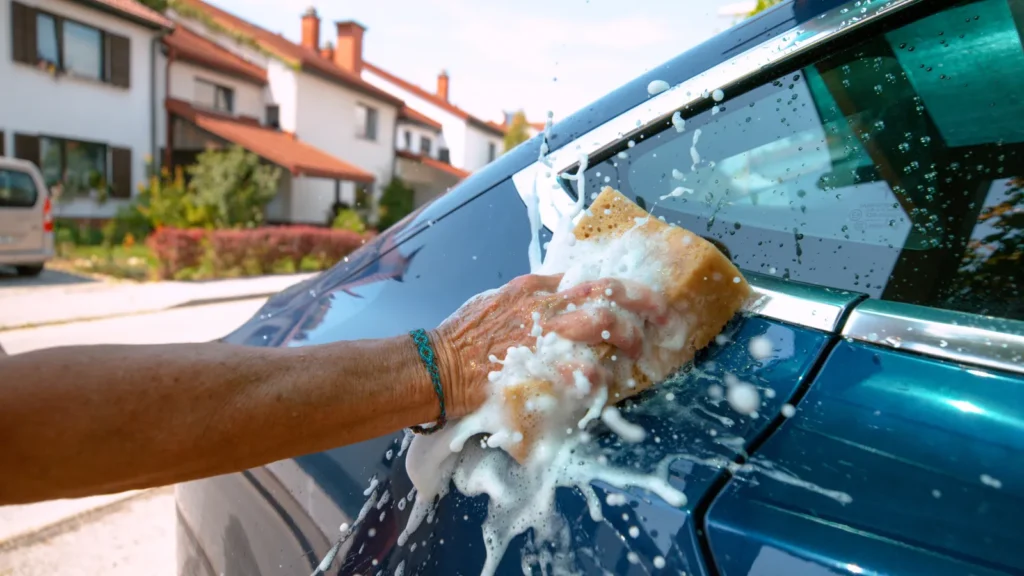Are you tired of waiting in long lines at the car wash or spending a lot of money on professional detailing services? Now is the time to invest in some great DIY car wash tools and do it yourself. Having your own car wash saves you time and money, and you can give your favorite car the care it needs from the comfort of your own driveway.
2. Basic things you need
2.1. Hoses and windshield wipers
Any DIY car wash installation requires a sturdy hose and well-oiled tools. Choose a high-quality hose that is flexible, strong and can reach all the way to the back of the car. Look for a nozzle that changes the spray pattern so you can rinse lightly and spray vigorously when necessary.
Bags and sponges 2.2
For the pre-wash and wash steps of cleaning your car, you will need a bucket and a sponge. To keep things from getting dirty, buy two separate buckets for soapy water and rinse water. To prevent scratches on your car paint, choose a soft, scratch-free brush.
3. High-tech instruments
3.1. High pressure cleaning machine
A high-pressure cleaner is an indispensable tool for better cleaning results and faster dirt removal. Whether you choose an electric or pneumatic type, make sure you can adjust the pressure to suit different cleaning jobs. If you have the right tools, you can clean everything from stubborn dirt to fine trim work without damaging anything.
3.2. Foam cannon
Foam guns take car washing to the next level by creating thick, sticky foam that better lubricates and holds dirt. For best results, look for a spray gun that allows you to vary the amount of foam you use with a pressure washer.
4. Dry tools
4.1 Microfiber cloths
Microfiber cloths are highly absorbent and can help you maintain shine without streaks. Microfiber towels are gentle on painted surfaces and don’t leave lint or residue like cotton towels. Available in different thicknesses and sizes, so you can easily dry different items.
4.2.Fan
A blower is very useful for getting into cracks and doing delicate finishing work. Choose a portable, lightweight model with adjustable airflow settings to safely and effectively blow water out of cracks and crevices without damaging anything.
5. Equipment maintenance
5.1
Using a clay bar, you can restore a smooth, glass-like finish to your car. The wand removes dirt and other imperfections from paint surfaces. When you use it with good quality oil, it will glide smoothly and provide better results, making your car’s paint look like new.
5.2. Nail file
If you want your car to look like a shop car, you need a polisher. Whether you prefer a rotary buffer or a dual-action eccentric polisher, choose one with adjustable speed settings and an ergonomic design for optimal control and comfort during long cleaning sessions.
6.Finally
Finally, getting the right self-service car wash can turn your yard into a haven for car maintenance. Every piece of equipment, from basics like hoses and brushes to more advanced equipment like pressure washers and polishers, is needed to get results that look like they were done by a professional. That said, why stand in line at a car wash when you can get your own car washed?
FAQ:
How often should I wash my car?
This depends on factors such as the weather, the way people drive and the pollution in their environment. In general, you should wash your car at least once a month. If there is a lot of dirt or debris, you should clean it more often.
Can I use dish soap to wash my car?
Dish soap is great for removing grease and grime, but you shouldn’t use it to wash your car because it can remove the wax that protects the paint and damage the finish. Instead, you should use a pH-balanced soap designed to clean automotive surfaces.
Should I wax my car after washing it?
Waxing is an important part of keeping your car in good condition and maintaining its shine. Use a high-quality car wax every three to six months to protect it from UV damage, water stains and other environmental agents.
Can I use a pump washer to clean my car windows?
You can safely clean car windows with a pressure washer, but make sure you use the lowest pressure setting and stay away from the glass to avoid damage or cracking.

